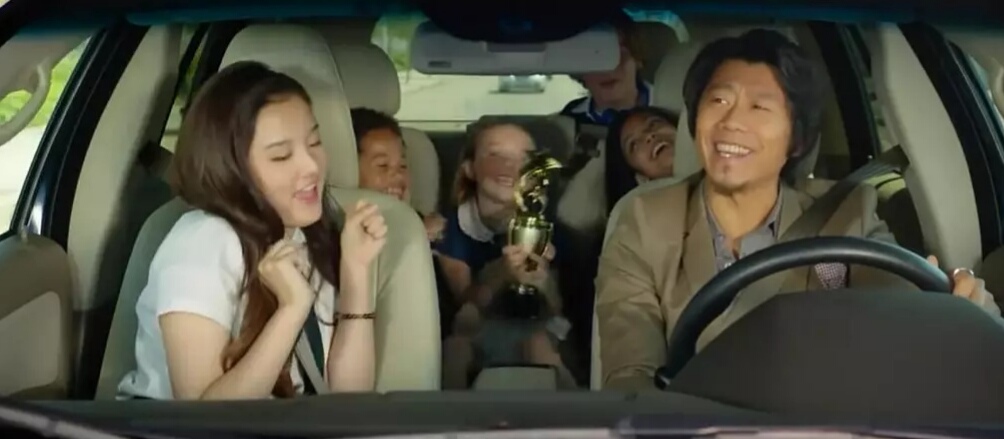By Chlotrudis Independent Film Society
Rating: 2.75
Director: Zheng Xiao
Starring: Brother Sway | David Wu | Dennis Joseph O'Neil | JiangShan | Macy Gray | Song Zuer | Xia Yu | Yang Zi

Original language title: Luo shan ji dao dan ji hua
Country: china
Year: 2016
Running time: 106
IMDB: https://www.imdb.com/title/tt4694440/reference
Jason says: “There’s always something a bit off about movies like PAPA though they are set in America and surround their (in this case) Chinese star with local actors, the filmmakers don’t quite know how everyday English sounds or the finer details of the culture, so what seems perfectly reasonable when the movie is shown in Beijing gnaw at am American viewer a bit. Sure, that’s kind of background noise for a movie that fuses ‘unprepared parent’ and ‘green-card marriage’ genres and doesn’t exactly reinvent either, but it also highlights their issues.
“In this case, the poor sap at the middle of everything is Huang Bolun (Xia Yu), a talent agent who came to Los Angeles to find Nina Wang (Yang Zi), a client who went AWOL with Bolun’s assistant Jason Chen (Dennis Joseph O’Neil) several months ago, leaving Bolun in deep trouble with Boss Du (David Wu). With Bolun’s via about to expire, his friend Ye Qiang (Brother Sway) arranges a green-card marriage to Gao Yunshu (Jiang Shan). Not only is she not exactly what Bolun expected from her picture, but their Vegas wedding and ‘honeymoon’ ends in disaster. That’s when Bolun learns that not only does Yunshu have a fifteen-year-old daughter in Coco (Song Zuer), but four other adopted children besides. And while Coco is willing to play along to keep her family from being broken up, ICE agent Alicia Sterling (Macy Gray) smells a rat.
“The credits make reference to this being a remake, although even if it weren’t, portions certainly play out entirely as expected, right down to Bolun having to balance responsibilities and ambitions when it turns out that Coco is every bit the natural talent that Nina is. Often, both the script and director Zheng Xiao seem to feel as intimidated by the English/Mandarin language barrier as the characters are, never really seizing the chance to build a fast-paced, funny sequence out of the dozens of misunderstandings and bits of culture shock that this situation should produce, often being satisfied to just check the things one expects from this storyline off. The desperation that motivated the sham marriage on both sides never seems evident later on, and pieces like the return of one child’s birth mother don’t write fit. Right down to an epilogue that seems like a big leap from the scene that immediately precedes it, PAPA often feels like the outline of a movie as much as the finished product.
“That it’s a bit of an uninspired variation on a theme is disappointing, although there are some bits of inspiration that make it a little more interesting than some. Once it starts to come out that Nina ran off in part because Bolun sucked at the parts of being a manager that parallel parental responsibility, and that he’s a failed singer himself, his instincts to exploit Coco snap into clearer focus. The kids are actually a fairly entertaining group, playing as individuals rather than just an ethnically diverse mass that overwhelms Bolun. And while Zheng mostly plays the comedy up front, he does make sure to remember that this sort of story is pushed forward by tragedy and selfishness, serving up pointed reminders whenever it seems like things are being taken too lightly.
“The best of these scenes are between Bolun and Coco, and it’s probably no coincidence that their interactions are in Mandarin. Xia Yu gets the broadest comic bits as Bolun, able to play big because people are expected to see through his crap, but by the same token selling that he’s at least trying to be a good father because the same impulsiveness that gets him in trouble will also be triggered by a cute kid. Song Zuer gets to play the teenager who looks askance at this adult’s idiocy, but she puts more than rolled eyes and frustration that this doofus isn’t taking things seriously into her performance. Song never loses track of the fact that Coco is dealing with a big loss and had her own issues outside of the movie’s plot. They work off each other nicely in large part because they never try to force a conventional father-daughter dynamic, or even the expected stepfather-stepdaughter ones.
“It’s not quite enough to breathe new life into fairly tired martial, even though grafting a parent-child relationship onto what’s usually a romantic comedy plot is kind of clever. Papa has enough laughs to get by, even if it also has enough missed opportunities to make one curious about how it could have gone if certain things were done just a little bit better.
“Screened in AMC Boston Common #12 (first-run, DCP).”
